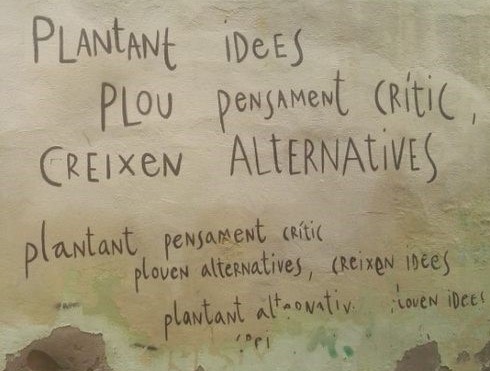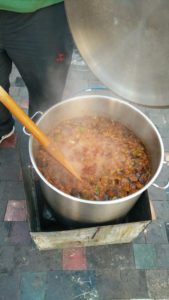Food sharers working in the shadows of policy
Published by Agnese Cretella on the 7th August 2019.

Hello to everyone following the SHARECITY research!
It is holiday time, but we have many exciting things happening right now at SHARECITY! Our open access online sustainability impacts tool – SHARE-IT – is currently being tested and will be launched in the Autumn, we are working on the last logistical details for our international SHARING-FUTURES workshop at the end of September which will focus on policy challenges and responses to support sustainable food sharing, and we are busy examining the interesting insights from our comparative governance analysis of food sharing across our case studies cities. Some of these findings will be published in a Special Issue on Food Democracy in the journal Politics and Government soon. Watch this space!
Urban governance affects food sharing in many ways. We have found that food sharing initiatives of all kinds – from the shared growing of community gardens, through the collaborative cooking and eating activities of community kitchens, to the redistributive work of surplus food initiatives – are experiencing daily policy challenges that directly and indirectly affect their activities and the achievement of their goals. These issues were directly addressed in relation to surplus food redistribution and community fridges in Berlin by SHARECITY researcher Oona Morrow and in relation to the gifting of free food in public spaces, underground food markets and community seed sharing in the US in Anna Davies’ recent book Urban Food Sharing.
The ways food sharing initiatives confront these challenges are very different, but one approach is to ignore existing policies and regulations! This radical approach has disadvantages of course, for example, it means initiatives are not in a position to secure government funding, or attain a seat in formal policy discussions and not least it means the initiatives may be exposed to fines and legal liability issues. On the other hand, working off the policy radar, through squatted lands, spaces or without obtaining permits for their activities, gives food sharing initiatives the opportunity to experiment with different activities that question the status quo and its flawed food system. It also does not mean that such food sharing practices are without rules, as one participant puts it, “it’s much easier not to be legal and just do whatever we want. We are self-responsible in what we do” (Growing initiative, Barcelona).
In recent years, there have been many attempts in different cities to institutionalize grassroots food initiatives, for instance by creating policies that – rhetorically at least – reflect the goals of food movements around food democracy, justice and sovereignty. This is the case for instance of urban food strategies (the focus of my PhD), widely perceived as democracy-enhancing, sustainable, progressive policy efforts.
In my recent paper just published in the Journal of Rural Studies, Alternative food and the urban institutional agenda: Challenges and insights from Pisa, I specifically explore the tensions between grassroots food initiatives and institutionalization attempts by discussing the development of the Pisa food strategy (Italy). As a recurring theme in many other urban contexts, food grassroots movements often feel that the institutional interest in them is not well placed. In Pisa for instance, food grassroots movements decided not to get involved with the food strategy development. This is, among other reasons, because such institutional interest is perceived as a mere appropriation of their aspirations and goals: “It’s the norm not just in Pisa or Italy but also in Europe that institutions subsume the concepts of social movements” (Pisa, pp. 126).
The very same idea emerges through the SHARECITY interviews I am currently analyzing: “The state always assimilates the best ideas of the grassroots movements, distorting the original goals, aims and ideology behind these ideas and actions” (Cooking and eating initiative, Athens). In my paper, I argue that food and grassroots projects might be subject to co-option in order for the political parties in power to gain civic consensus. This idea is further substantiated by the SHARECITY interviews conducted in Athens:
“Political parties and politicians try to take advantage of us by trying to get their picture taken behind the pot with us. This pot is sacred though. This is where all people gather around to eat regardless of political parties and political beliefs, what bonds us is love. So, it’s unacceptable when somebody tries to take advantage of it.” (Cooking and eating initiative, Athens).
In many cities, institutionalization attempts are often a response to spontaneous community organizing. In Pisa as well, the food strategy mainly consisted of the design of an institutional framework around such spontaneous initiatives, but ended up being more of a statement of alignment with grassroots food movements’ than an actual policy. The risk, as I argue, is to produce normative actions that end up both challenging and draining away the discursive apparatus of food movements. Paradoxically, the movements that propel alternative discourses are usually the last to be involved in the policy making process.
All these insights should remind us that there is not yet a straightforward way for building urban food polices which are inclusive and effective. Truth is that food still constitutes a conflictual, problematic and contested matter to deal with at the policy level. In the multi-stakeholder workshop we are organizing at the end of September, we will bring to the same table practitioners, activists, academics and policymakers to discuss ways to address the political, discursive, policy and legal challenges currently affecting food-sharing initiatives.
Feel free to share your thoughts in the comments section below and stay tuned on SHARECITY to know more about the results of our collective discussions!
– Agnese
© 2015 - 2024 ShareCity | Web Design Agency Webbiz.ie








